英语常用介词
40个英语介词用法总结
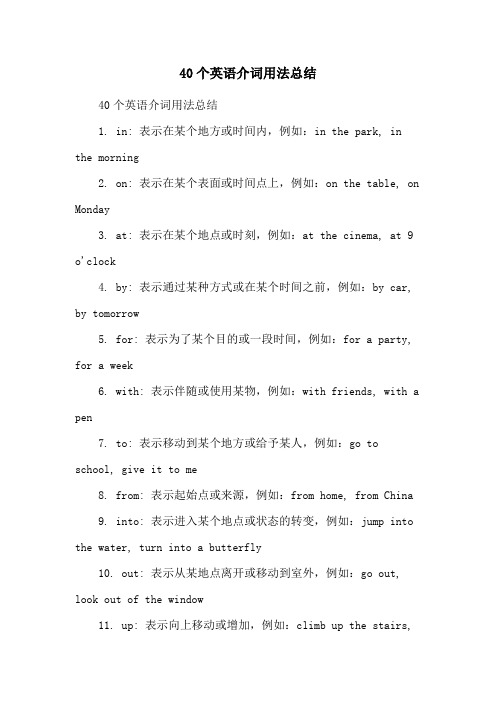
40个英语介词用法总结40个英语介词用法总结1. in: 表示在某个地方或时间内,例如:in the park, in the morning2. on: 表示在某个表面或时间点上,例如:on the table, on Monday3. at: 表示在某个地点或时刻,例如:at the cinema, at 9 o'clock4. by: 表示通过某种方式或在某个时间之前,例如:by car, by tomorrow5. for: 表示为了某个目的或一段时间,例如:for a party, for a week6. with: 表示伴随或使用某物,例如:with friends, with a pen7. to: 表示移动到某个地方或给予某人,例如:go to school, give it to me8. from: 表示起始点或来源,例如:from home, from China9. into: 表示进入某个地点或状态的转变,例如:jump into the water, turn into a butterfly10. out: 表示从某地点离开或移动到室外,例如:go out, look out of the window11. up: 表示向上移动或增加,例如:climb up the stairs,wake up12. down: 表示向下移动或减少,例如:walk down the hill, calm down13. about: 表示关于某事或在某个范围内,例如:talk about the movie, wander about the city14. off: 表示离开或关闭,例如:get off the bus, turnoff the lights15. on: 表示打开或激活,例如:turn on the TV, switch on the computer16. over: 表示越过或在某地上方,例如:jump over the fence, fly over the city17. under: 表示在某物下面或被控制或影响,例如:hide under the bed, live under his rules18. with: 表示具有某种特征或和某人一起做某事,例如:a man with blue eyes, dance with me19. without: 表示没有某物或在缺乏某物的情况下,例如:go without food, live without regret20. by: 表示通过某种方式,例如:learn by doing, go by bus21. through: 表示穿过某物或完成某事,例如:walk through the door, go through the documents22. across: 表示横穿某物或在某个范围内,例如:swimacross the river, all across the world23. between: 表示在两个事物之间或在某个时间段,例如:choose between two options, between 9 and 10 o'clock24. among: 表示在三个或三个以上事物之间或在某群人中,例如:share among friends, discuss among colleagues25. around: 表示在周围或在某个时间点附近,例如:walk around the park, around midnight26. through: 表示通过某事物或在某段时间内,例如:read through the book, work through the night27. against: 表示反对或靠在某物上,例如:fight against injustice, lean against the wall28. for: 表示代表或支持某人或某事,例如:vote for a candidate, fight for freedom29. towards: 表示朝向某个方向或对某人有好感,例如:walk towards the beach, feel towards someone30. within: 表示在某个时间或范围内,例如:arrive within an hour, within the city limits31. beyond: 表示超出某个界限或超过某个程度,例如:beyond expectations, beyond the horizon32. along: 表示沿着某个路线或伴随某人一起,例如:walk along the street, sing along with the song33. above: 表示在某物之上或高于某个程度,例如:flyabove the clouds, above average34. below: 表示在某物之下或低于某个程度,例如:swim below the surface, below freezing35. beside: 表示在某物旁边或和某人一起,例如:sit beside me, beside the lake36. near: 表示在某物附近或接近某个时间,例如:live near the beach, near the end37. past: 表示经过某个地点或在某个时间之后,例如:walk past the store, past midnight38. around: 表示在周围或大约某个数量,例如:look around the room, around 20 people39. after: 表示在某个时间之后或追求某人或某事,例如:after dinner, run after the dog40. before: 表示在某个时间之前或在某个事件之前,例如:before sunrise, before the meeting这些介词是英语中常用的一些基本介词,它们在表达地点、时间、方式等方面起到了重要的作用。
15个英语最常见的介词用法-极简英语

15个英语最常见介词(in on at of for...)的深层次含义英文中15个最常见的介词in/ on/at/of/ for/by /with/ from/to/as/ about/ around/ off/ through/ over一、in (在..里面)1.表示真实的位置: in the car/room2表示抽象的位置: in the book/movie3.表示状态: in danger, in trouble; in anger3.表示时间: in the morning/afternoon/evening. in April; in 20104.表示方式: in the way; in English5.表示穿着: in black shoes/T-shirt二、on (紧紧地接触-连着)1.表示真实的位置: on the table/wall2.表示抽象的位置: on the radio/TV; on the topic/event3.表示具体的时间: on Monday; on Monday morning; on May 4th4.表示状态: on duty; on holiday; the game is on三、at(在.点上)1.表示真实的位置: at home/the company/the store2.表示抽象的位置: be good/bad at English3.表示具体的时间: at 3 pm;at night; at the age of 204.表示状态: at work-在工作; at table-在吃饭四、Of(的-从属关系)1.表示"无生命主体的":the window of the room; top of the mountain...2.某某市: the city of Bejing3.表示数量: a piece/bx/bottle/pair.. of五、for(为了/因为/对时间/对.而言/支持赞成)1.表示为了":go for a walk; I come here fr my schoolbag2.表示"因为": Thank you for helping me; for the reason3.表示"时间"和: for 3 days; for a week; for a year4.表示对..而言": It is important for me5.表示”支持,赞成": Are you for this plan or against it?六、by(通过.交通工具/在.附近/街至.时间/被)1.表示"通过.交通工具":by train/subway/plane/air/ship/seaI learn English by watchingEnglish movies.2.表示在附近":a table by the window; the house is by the lake3.表示"截至到..时间":by the end of next week; by 20194.表示"被(被动语态)":English is spoken by people all over the world.七、with (伴随)1.表示"和.起":go with:play with;make friends with;cooperate with2.表示"携有,带有":a county with a long history; a house with a big garden3.表示..工具:cut the apple with the knife4.表示"伴随":with the development of the society;with the help of my teacher;I don't have any cash with me.八、from (远离)1.表示"来自":I am/come from China;a gift from my best friend;a man from America2.由"远离"来记短语:stop/prevent/keep sb from doing sth阻止某人做某事be away from...远离...be different from与.不同be absent from缺席....how far is it from here?它离这远The paper is made from wood.这纸是由木头制成的3.表示..到": from...to...由"指向"来理解下列用法:The road leads to Paris.这条路通往巴黎Smoking is harmful to your health.吸烟有害健康the answer to the question.这个问题的答案九、to (指向..)contribute to对..做贡献on one's way to... 在某人去某地的路上belong to属于..be used to doing sth习惯于做某事lead to...导致十、as作为He works as a tour guide.他作为导游工作。
总结英语介词

总结英语介词英语介词是连接词,用于表达名词、代词、或者其他词组之间关系的词语。
它们在语法中起着非常重要的作用。
正确地使用英语介词可以让我们的语言更加流畅、准确。
本文将总结常用的英语介词,分为时间、地点和方式三个方面进行介绍。
一、时间介词1.at:用于具体的时刻、节日或者星期几。
例如:at 3 o’clock, atChristmas, at Sunday.2.in:用于表示季节、一天中的具体时间以及较长的时间段。
例如:insummer, in the morning, in a week.3.on:用于表示具体的日期或者某些特定的日子。
例如:on July 4th,on New Year’s day, on Monday.4.since:用于表示从过去某个具体时间开始一直延续至今。
例如:since 2010, since I was a child.5.for:用于表示一段时间的长短。
例如:for 2 hours, for a week, for along time.二、地点介词1.in:用于表示某个地点、国家或城市。
例如:in the park, in China, inLondon.2.at:用于表示具体的地点或者建筑物。
例如:at the cinema, at therestaurant, at home.3.on:用于表示在某个具体的平面或物体之上。
例如:on the table, onthe wall, on the floor.4.under:用于表示在某个物体的下面。
例如:under the tree, underthe bed.5.next to:用于表示在某个物体旁边。
例如:next to the chair, next tothe river.三、方式介词1.by:用于表示通过某种交通工具或手段。
例如:by car, by train, byemail.2.with:用于表示使用某种工具或方式。
40个英语介词
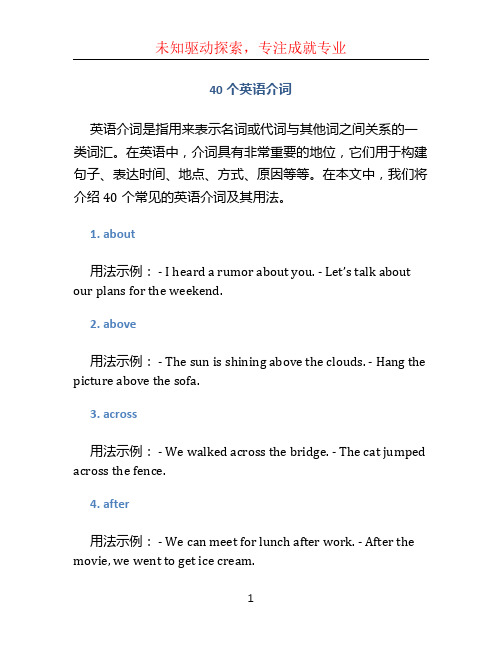
40个英语介词英语介词是指用来表示名词或代词与其他词之间关系的一类词汇。
在英语中,介词具有非常重要的地位,它们用于构建句子、表达时间、地点、方式、原因等等。
在本文中,我们将介绍40个常见的英语介词及其用法。
1. about用法示例: - I heard a rumor about you. - Let’s talk about our plans for the weekend.2. above用法示例: - The sun is shining above the clouds. - Hang the picture above the sofa.3. across用法示例: - We walked across the bridge. - The cat jumped across the fence.4. after用法示例: - We can meet for lunch after work. - After the movie, we went to get ice cream.5. against用法示例: - He leaned against the wall. - The cat rubbed against my leg.6. along用法示例: - We walked along the beach. - Drive along the highway until you see the sign.7. among用法示例: - There is a sense of camaraderie among the team members. - The book is hidden among the other books on the shelf.8. around用法示例: - The children ran around the playground. - We walked around the park.9. as用法示例: - She worked as a teacher for many years. - You can use this hammer as a tool.10. at用法示例: - I met him at the café. - The meeting is scheduled at noon.11. before用法示例: - Let’s finish this task before the deadline. - He left the house before sunrise.12. behind用法示例: - The car is parked behind the building. - He hid behind the tree.13. below用法示例: - The temperature is below freezing. - The answer is written below the question.14. beneath用法示例: - The treasure is buried beneath the sand. - He found a note hidden beneath the pillow.15. beside用法示例: - She sat beside her friend. - Put the book beside the vase.16. between用法示例: - I couldn’t decide between the re d or blue dress. - The lake is located between the mountains.17. beyond用法示例: - His achievements go beyond his qualifications. - The house is just beyond the hills.18. by用法示例: - The package was delivered by the mailman. - I traveled to London by plane.19. despite用法示例: - He continued working despite the fatigue. - Despite the rain, we went for a walk.20. down用法示例: - We walked down the stairs. - The book fell down from the shelf.21. during用法示例: - We went on vacation during the summer. - I read a book during the flight.22. except用法示例: - Everyone was present except for John. - We ate all the cake except for one slice.23. for用法示例: - This gift is for you. - He studied for hours.24. from用法示例: - He received a letter from his friend. - She ran away from the crowd.25. in用法示例: - The book is in the bag. - She lives in Paris.26. inside用法示例: - He is waiting inside the building. - The keys are inside my pocket.27. into用法示例: - He jumped into the pool. - Pour the milk into a glass.28. like用法示例: - I feel like going for a walk. - He looks like his father.29. near用法示例: - There is a coffee shop near the office. - The playground is near the school.30. of用法示例: - She is the mother of two children. - The top of the mountain was covered in snow.31. off用法示例: - He took the hat off his head. - The plane took off from the runway.32. on用法示例: - The book is on the table. - I put on my coat.33. out用法示例: - He stepped out of the house. - She blew out the candles.用法示例: - The cat is sitting outside the window. - He is waiting outside the door.35. over用法示例: - We talked over dinner. - The ball jumped over the fence.36. past用法示例: - She walked past the store. - We drove past the old church.37. round用法示例: - We sat around the table. - The bus goes round the city.38. through用法示例: - He read through the book. - They walked through the forest.39. to用法示例: - He gave the present to his sister. - We went to the park.用法示例: - The cat is sleeping under the table. - The book is under the bed.以上是40个常用的英语介词及其用法。
英语中常用的介词
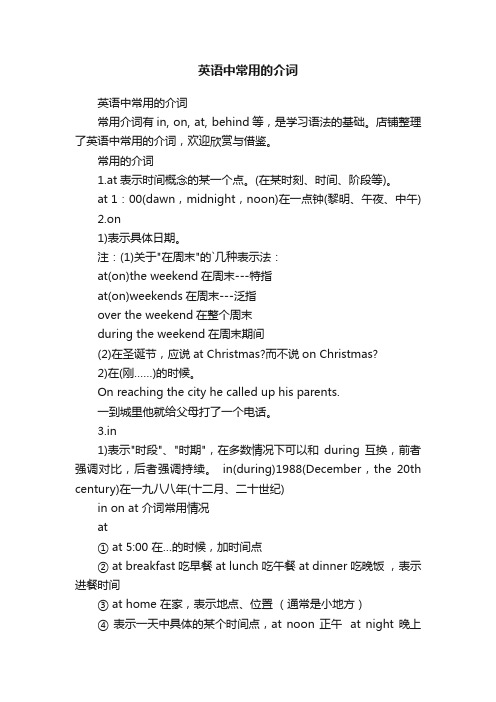
英语中常用的介词英语中常用的介词常用介词有in, on, at, behind等,是学习语法的基础。
店铺整理了英语中常用的介词,欢迎欣赏与借鉴。
常用的介词1.at表示时间概念的某一个点。
(在某时刻、时间、阶段等)。
at 1:00(dawn,midnight,noon)在一点钟(黎明、午夜、中午)2.on1)表示具体日期。
注:(1)关于"在周末"的`几种表示法:at(on)the weekend在周末---特指at(on)weekends在周末---泛指over the weekend在整个周末during the weekend在周末期间(2)在圣诞节,应说at Christmas?而不说on Christmas?2)在(刚……)的时候。
On reaching the city he called up his parents.一到城里他就给父母打了一个电话。
3.in1)表示"时段"、"时期",在多数情况下可以和during互换,前者强调对比,后者强调持续。
in(during)1988(December,the 20th century)在一九八八年(十二月、二十世纪)in on at 介词常用情况at① at 5:00 在…的时候,加时间点② at breakfast 吃早餐 at lunch 吃午餐 at dinner 吃晚饭,表示进餐时间③ at home 在家,表示地点、位置(通常是小地方)④ 表示一天中具体的某个时间点,at noon 正午 at night 晚上at sunrise 日出⑤ 动词+at,指向某一目标或者到达某地。
arrive at 到达 knock at 敲⑥ at 15 years old 表示某个阶段,加年龄in① in the box 在盒子里面② in shanghai 在上海,表示地点、位置(通常是大地方)③ in her twenties and thirties 在她二三十岁的时候,表示一段时期④ in ten days 十天之后,加时间段表示在…之后⑤ in English 用英语,加语言表示使用什么语言on① on the table 在桌子上② on Sunday 在星期天,具体到某一天或者某一天的早上下午晚上,on Sunday night【英语中常用的介词】。
40个英语介词用法总结
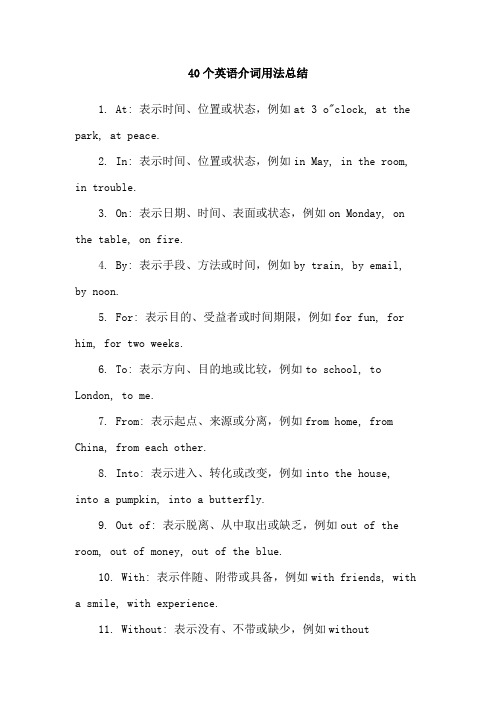
40个英语介词用法总结1. At: 表示时间、位置或状态,例如at 3 o"clock, at the park, at peace.2. In: 表示时间、位置或状态,例如in May, in the room, in trouble.3. On: 表示日期、时间、表面或状态,例如on Monday, on the table, on fire.4. By: 表示手段、方法或时间,例如by train, by email, by noon.5. For: 表示目的、受益者或时间期限,例如for fun, for him, for two weeks.6. To: 表示方向、目的地或比较,例如to school, to London, to me.7. From: 表示起点、来源或分离,例如from home, from China, from each other.8. Into: 表示进入、转化或改变,例如into the house,into a pumpkin, into a butterfly.9. Out of: 表示脱离、从中取出或缺乏,例如out of the room, out of money, out of the blue.10. With: 表示伴随、附带或具备,例如with friends, witha smile, with experience.11. Without: 表示没有、不带或缺少,例如withoutpermission, without shoes, without doubt.12. Over: 表示覆盖、超过或结束,例如over the roof, over the limit, over and done with.13. Under: 表示在下面、被支配或不足,例如under the table, under his control, under budget.14. About: 表示关于、大约或忙于,例如about the movie, about 10 dollars, about to leave.15. Above: 表示在上面、高于或超过,例如above the clouds, above average, above suspicion.16. Below: 表示在下面、低于或不足,例如below the surface, below freezing, below par.17. Across: 表示横穿、相交或涉及,例如across the street, across the board, across his mind.18. Beyond: 表示超出、远离或除了,例如beyond repair, beyond belief, beyond her control.19. Around: 表示周围、附近或环绕,例如around the corner, around the clock, around the world.20. Before: 表示以前、在前面或比较,例如before noon, before the house, before his time.21. Behind: 表示在后面、落后或背后,例如behind the house, behind schedule, behind the scenes.22. Beside: 表示在旁边、与...相比或附加,例如besidethe river, beside myself, beside the point.23. Inside: 表示内部、在里面或被包含,例如inside the box, inside the building, inside information.24. Outside: 表示外部、在外面或超出,例如outside the house, outside the box, outside the norm.25. Through: 表示穿过、经过或完成,例如through the door, through the park, through with it.26. Throughout: 表示遍布、贯穿或在整个期间,例如throughout the city, throughout history, throughout the day.27. Towards: 表示朝向、对于或接近,例如towards the sun, towards him, towards the end.28. Against: 表示反对、抵抗或紧挨着,例如against the law, against the current, against the wall.29. Among: 表示在...之中、相互之间或被分配到,例如among friends, among the stars, among the winners.30. Between: 表示在两者之间、在中间或相互之间,例如between two trees, between classes, between you and me.31. Within: 表示在内部、在范围之内或在规定时间内,例如within the house, within the budget, within a week.32. Without: 表示在外面、没有或不用,例如without the room, without a doubt, without further ado.33. Beneath: 表示在下面、低于或不足,例如beneath the surface, beneath his dignity, beneath contempt.34. Beside: 表示在旁边、与...相比或附加,例如beside the river, beside myself, beside the point.35. Into: 表示进入、转化或改变,例如into the house, into a pumpkin, into a butterfly.36. Upon: 表示在...之上、一旦发生或基于,例如upon the hill, upon arrival, upon further consideration.37. With: 表示伴随、附带或具备,例如with friends, witha smile, with experience.38. Within: 表示在内部、在范围之内或在规定时间内,例如within the house, within the budget, within a week.39. Without: 表示没有、不带或缺少,例如without permission, without shoes, without doubt.40. Beneath: 表示在下面、低于或不足,例如beneath the surface, beneath his dignity, beneath contempt.。
常用的英语介词
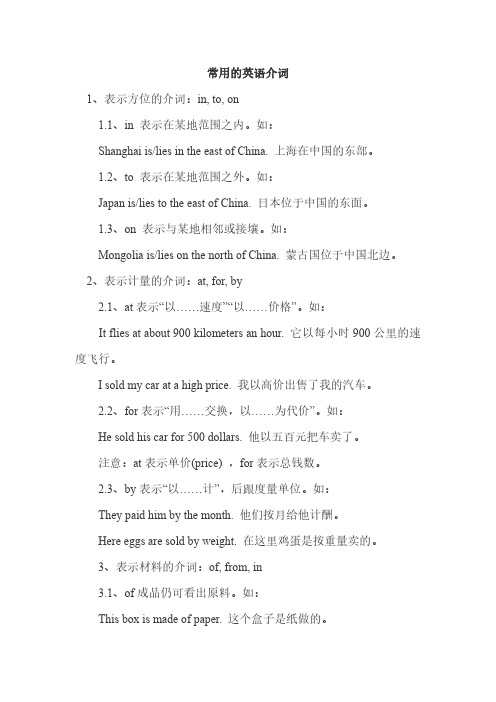
常用的英语介词1、表示方位的介词:in,to,on1.1、in表示在某地范围之内。
如:Shanghai is/lies in the east of China.上海在中国的东部。
1.2、to表示在某地范围之外。
如:Japan is/lies to the east of China.日本位于中国的东面。
1.3、on表示与某地相邻或接壤。
如:Mongolia is/lies on the north of China.蒙古国位于中国北边。
2、表示计量的介词:at,for,by2.1、at表示“以……速度”“以……价格”。
如:It flies at about900kilometers an hour.它以每小时900公里的速度飞行。
I sold my car at a high price.我以高价出售了我的汽车。
2.2、for表示“用……交换,以……为代价”。
如:He sold his car for500dollars.他以五百元把车卖了。
注意:at表示单价(price),for表示总钱数。
2.3、by表示“以……计”,后跟度量单位。
如:They paid him by the month.他们按月给他计酬。
Here eggs are sold by weight.在这里鸡蛋是按重量卖的。
3、表示材料的介词:of,from,in3.1、of成品仍可看出原料。
如:This box is made of paper.这个盒子是纸做的。
3.2、from成品已看不出原料。
如:Wine is made from grapes.葡萄酒是葡萄酿成的。
3.3、in表示用某种材料或语言。
如:Please fill in the form in pencil first.请先用铅笔填写这个表格。
They talk in English.他们用英语交谈。
注意:in指用材料,不用冠词;而with指用工具,要用冠词。
英语介词大汇总57个

57个介词aboard[əˈbɔːd] prep. 上(船,飞机,火车,汽车等)about[əˈbaʊt] ad. 大约;到处;四处prep. 关于;在各处;四处above [əˈbʌv] prep. 在……上面a. 上面的ad. 在……之上across[əˈkrɔs] prep. 横过,穿过after[ˈɑːftə(r)]r ad. 在后;后来prep. 在…之后;在后面conj. 在…以后against[əˈɡeinst] prep. 对着,反对along[əˈlɔŋ; (uS) əˈlɔŋ] ad. 向前;和…一起;一同prep. 沿着;顺着among[əˈmʌŋ] prep. 在…中间;在(三个以上)之间around[əˈraʊnd] ad. 在周围;在附近prep. 在……周围;大约as[əz, æz] ad.& conj.像……一样;如同;因为prep. 作为,当做at[æt] prep.在(几点钟);在(某处)before[biˈfɔː(r)] prep. 在…以前;在…前面ad. 以前conj. 在…之前behind [biˈhaind]prep. (表示位置)在…后面ad. 在后面;向后below[biˈləʊ] prep. 在……下面beneath[biˈniːθ] prep. 在…下方(面)beside[biˈsaid] prep. 在…旁边;靠近besides[biˈsaidz] prep. 除…以外(还有)ad. 还有,此外between[biˈtwiːn] prep. 在(两者)之间;在…中间beyond[biˈjɔnd] prep. (表示位置) 在…的那边but [bət, bʌt] conj. 但是,可是prep. 除了, 除……外by [bai] prep. 靠近,在…旁;在…时间;不迟于;被;用;由;乘(车)down[daʊn] prep. 沿着,沿…而下ad. 向下during [ˈdjʊəriŋ; (uS) ˈdʊəriŋ]prep. 在…期间;在…过程中except [ikˈsept]prep. 除……之外for [fə(r), fɔː(r)] prep. 为了…;向…,往…;与…交换;防备…;适合…;因为…;在…期间;对于…;对…来说conj. 因为,由于from[frəm, frɔm] prep.从;从…起.距.来自in [in] prep. 在…里(内);在…;以…ad. 在家,在内,向内inside [inˈsaid] prep.在…里面ad.在里面into [ˈintʊ, ˈintə] prep. 到…里;向内;变成like [laik] prep. 像,跟…一样vt. 喜欢,喜爱minus [ˈmainəs] prep. & a.负的,减去的near[niə(r)] a. 近的ad. 附近,邻近prep. 在……附近,靠近of [ɔv, əv; (uS) ɔːf]prep.(表所属,数量,) ….的off[ˈɔf; (uS) ɔːf] prep. 离开,脱离,(走)开on[ɔn] prep. 在…上(时),关于ad. (穿,放…)上;接通;进行下去;(电灯)开onto[ˈɔntʊ] prep. 到…的上面outside[aʊtˈsaid] n. 外面ad. 在外面;向外面prep. 在…外面over[ˈəʊvə(r)] prep. 在…上方,越过,遍及ad. 翻倒,遍布,越过,结束past [pɑːst; (uS) pæst] ad. 过n.过去,昔日,往事prep. 过…,走过某处per [pə(r)] prep. 每,每一plus [plʌs] prep.加,加上round [raʊnd] ad. 转过来prep. 环绕一周,围着a.圆的;球形的since [sins]ad. 从那时以来conj. 从…以来,…以后,由于prep. 从…以来through [θruː] prep.穿(通)过;从始至终ad.穿(通)过;自始至终,全部throughout [θruːˈaʊt] prep. 遍及,贯穿till [til] conj.& prep.直到,直到…为止to [tʊ, tuː] prep. (动词不定式符号,无词义);(表示接受动作的人或物)给;对,向,到;在…之前toward(s) [təˈwɔːd] prep. 向,朝,对于under [ˈʌndə(r)] ad.& prep.在…下面,向…下面unlike [ʌnˈlaik] prep. 不像,和…不同until [ʌnˈtil] prep.& conj.直到…为止up [ʌp] ad. 向上;在上方;起来;在…以上a. 上面的,向上的,上行的n. 上升;上坡;上行;繁荣v. 举起;拿起;提高prep. 向(高处);向(在)……上(面)游upon [əˈpɔn] prep. 在……上面via [ˈvaiə] prep. 经过(某地),通过with [wiʃ] prep.关于,带有,以,和,用,有within [wiˈðin] prep. 在……里面without [wiˈðaʊt] prep. 没有。
- 1、下载文档前请自行甄别文档内容的完整性,平台不提供额外的编辑、内容补充、找答案等附加服务。
- 2、"仅部分预览"的文档,不可在线预览部分如存在完整性等问题,可反馈申请退款(可完整预览的文档不适用该条件!)。
- 3、如文档侵犯您的权益,请联系客服反馈,我们会尽快为您处理(人工客服工作时间:9:00-18:30)。
英语常用介词 Prepared on 22 November 2020(一)表示时间的介词:1.at, on, in(1) at表示“在某一时刻、某一时点”at 5:30在5:30 at sunrise 日出时 at lunch 午饭时at noon正午时 at night 夜间I get up at 6:00 every day. 我每天6:00起床。
表示“在……岁”时用at the age of…。
如:at the age of five.在五岁时。
(2) on表示“在具体某一天或某天的上、下午”。
如:on Monday在星期一 on April 1st在四月一日I heard a shot on the morning of March 18.三月十八日早晨我听到一声枪响。
泛指上、下午、晚上、夜间时用in the morning/afternoon/evening, at night;但若指具体某一天的上述时段时,则一律用on。
如:On the afternoon of May 23.在五月二十三日下午。
(3) in表示“在某月、季节、年、世纪”以及泛指的上、下午、晚上。
in September在九月in winter在冬季in 1999 在1999年 in the 20th century在20世纪in the morning/afternoon/evening 在上午/下午/晚上2.for, during, through(1) for表示“一段时间”,后接与数词连用的时间名词。
多与完成时连用。
I’ve been a soldier for 5 years.我入伍已5年了。
She has been ill for several days. 她已经病了几天了。
表示“持续一段时间”时,for后面必须跟“数字+时间名词”,而during后决不可接数字。
(2) during表示“在……期间”He visited many nice places during his stay here.在他逗留期间他参观了许多美丽的地方。
What did you do during the summer vacation 你在暑假做了什么?(3) through表示“一直……,自始至终”They worked hard through the winter.整个冬天他们都在努力工作。
She treated me like her brother through these years. 这些年来她始终把我当哥哥对待。
3.from, since(1) from表示“等时间的起点”,作“从……”解,多用于“from…to/till…”中。
You can come anytime from Monday to Friday.周一至周五你什幺时间来都行。
The exam will start from 9:00am. 考试将从上午九点开始。
①from“从……(开始)”未必持续到现在,如:from 1995 to 1998.从1995年到1998年。
而since是指“自从……以来一直持续到现在”②since一般只与现在完成时连用,而from不受此限。
(2) since表示“自从……以来(直到现在)”He has been away from home since 1973.他自从1973年就离开了家乡。
We have known each other since ten years ago.我们十年前就认识了。
for与since表示一段时间,但for与时间段连用,而since与时间点连用。
如for two hours(持续)两小时;since last week自从上周直到现在4.before, by, till, until(1) before指“在……之前”Please come before ten o’clock.请10点以前来。
The meeting will end after 3:00pm.会议将在下午三点后结束。
表示“在……以前”时,before与by基本可通用。
但by还有“截至……为止”之意,此时可与完成时连用,而before一般不与完成时连用。
如:How many models have you made by the end of last month?截至上月底你做了多少个模型?(2) by指“不迟于,到……时为止,在……以前”I must finish my homework by lunch.午饭前我必须做完作业。
We had learned over 1000 words by the end of last term.到上学期末为止,我们已经学了1000多个单词了。
(3) tell (until) “直到……为止”You must wait for him till tomorrow.你必须一直等到他明天。
He didn’t come back until twelve o’clock last night.他昨晚下到12点才回来。
在肯定句中,till (until)必须与延续动词连用。
若与点动词连用,till (until)只能用于否定句中。
5.after, in, within①after表示“在……之后”,是before的反义词。
We’ll hold a party after dinner.晚餐后我们将举办晚会。
He got a cancer and died after a year.他患了癌症,一年后去世了。
I’ll phone you after 1 arrive.到达后我给你打电话。
(after作连词)②within“在……时间之内”I can finish it with an hour.我不需一小时就可把它做完。
比较after与in①after后可跟时间段,也可跟时间点,如after school(放学后),而in后必须跟一段时间,如in an hour(一小时后)。
②after既可用于将来时,也可用于过去时,而in只能用于将来时。
③after既可作介词,又可作连词,而in只能作介词②in“在……时间之后”I’ll arrive in an hour.我一小时后到达。
in与within后都必须跟时间段。
(二)表示“地点、方向”的介词:1.in outside between, among①in表示“在……里面”,如:What’s in the box 盒子里是什么?She put her book in the desk. 她把书放进了书桌。
②outside指“在……外面”There are many people outside the room.房间外有很多人。
What did your see outside the hall 你在大厅外看见了什么?③between在……之间(指二者)There is a hospital between the hotel and the post office.在宾馆与邮局之间有所医院。
The building stands between the park and the small river. 那栋建筑位于公园和小河之间。
between是指“在两者之间”,而among指“在多个之间”。
④among在……之间(指三者以上)“There is a thief among you.” The policeman shouted to the crowd.警察向人群喊道:“你们中间有个小偷!”He found his place among the crowd. 他在人群中找到了他的位置。
2.on, above, over, below, under(1) on在……上面,表面相互接触。
There is an apple on the table. 桌上有一个苹果。
On the top of the hill, there is a flag. 山顶有一面旗子。
(2) above只表示“在……上方或位置高出……”,与below相对。
A plane flew above our heads.一架飞机从我们头上飞过。
The Turners live above us. 特纳一家人住在我们的上面。
(3) over“在……正上方”,与under相对。
There is a bridge over the river.河上有一座桥。
The picture is hanging over the blackboard. 那张图挂在黑板的正上方。
(4) below在……下方,低于……There are many flowers below the window.窗下有很多花。
Her skirt reaches just below her knees.她的裙子刚到膝盖下。
(5) under在……正下方They sat under a big tree, drinking.他们坐在一棵大树下喝酒。
What are you wearing under your coat 你外套里面穿了什么?3.near, by, beside(1) near在……附近,与far相对A hospital was built near the railway station.在火车站附近建了一所医院。
My hone is near he school. 我的家离学校很近。
(2) by = beside,靠近,在……旁边,比near距离更近He just sat by/ beside me in the cinema.在电影院他就坐在我旁边。
He lay down beside the statuary. 他在雕像旁躺下了。
4.in front of, behind, around(1) in front of在……前面A river flows in front of the house.房子前有一条河They put a bunch of flowers in front of the door. 他们在门前放了一束花。
in the front of表示“在……前部”,指里面。
There is a red chair in the front of the room.在房间前半部有把红椅子。
(2) behind在……后面A high building stands behind the village.村子后面有一高层建筑。
The cat lies behind the door. 猫躺在门后面。
(3) around在……周围,围绕There are many trees around the villege.村子周围有很多树围绕。
